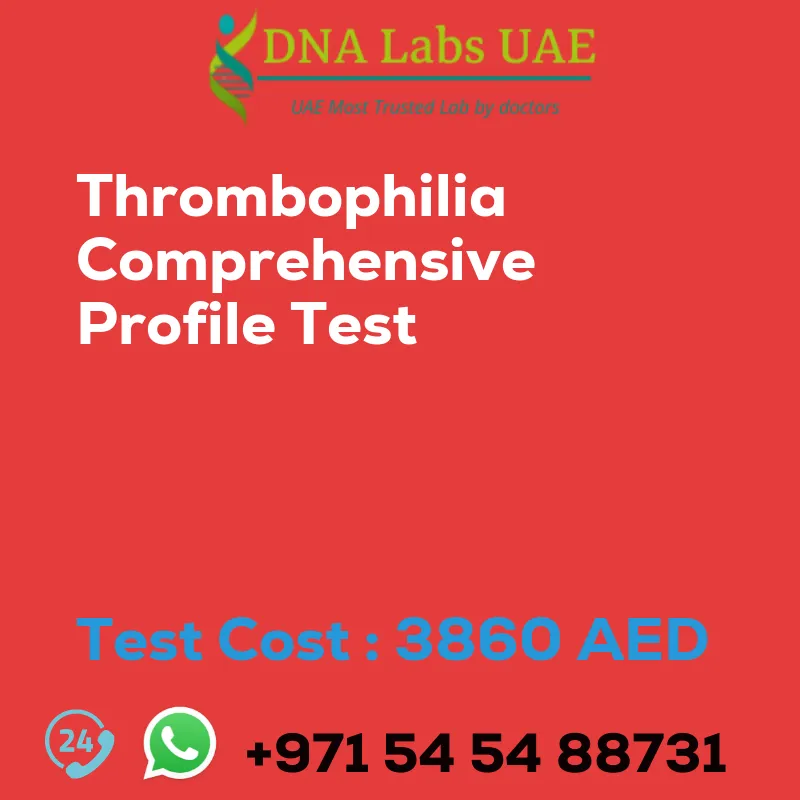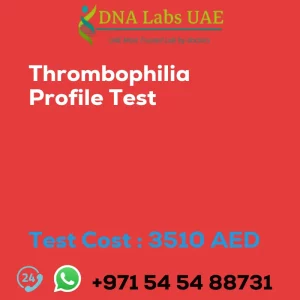Thrombophilia Comprehensive Profile Test
Test Name: THROMBOPHILIA COMPREHENSIVE PROFILE Test
Test Components:
- Protein C, Functional
- Protein S Antigen, Free
- Antithrombin Activity, Functional
- Factor V Leiden Mutation
- Prothrombin Gene Mutation
- MTHFR Gene Mutation
- Lupus Anticoagulant
Price: 3860.0 AED
Sample Condition:
- 6 mL whole blood in 2 Blue Top (Sodium Citrate) tubes. Mix thoroughly by inversion. Transport to Lab within 4 hours. If this is not possible, make PPP within 1 hour of collection as follows: Centrifuge sample at 3600rpm for 15 min. and transfer supernatant to a clean plastic tube. Centrifuge this supernatant again at 3600 rpm for 15 min. and finally transfer the supernatant (PPP) to 1 labelled clean plastic screw-capped vial. FREEZE IMMEDIATELY. Ship frozen. DO NOT THAW.
- 5 mL (3 mL min.) whole blood in 2 Lavender Top (EDTA) tubes. Ship refrigerated. DO NOT FREEZE. Overnight fasting is preferred. Duly filled Coagulation Requisition Form (Form 15) is mandatory. It is recommended that patient discontinues Heparin for 1 day and Oral Anticoagulants for 7 days prior to sampling as these drugs may affect test results. Discontinuation should be with prior consent from the treating Physician.
Report Delivery: Sample Mon / Thu by 11 am; Report Wed / Sat
Method: Electromechanical Clot Detection, Chromogenic, PCR, Immunoturbidimetry
Test Type: Disorders of Coagulation
Doctor: Hematologist
Test Department: COAGULATION
Pre Test Information: Overnight fasting is preferred. Duly filled Coagulation Requisition Form (Form 15) is mandatory. It is recommended that patient discontinues Heparin for 1 day and Oral Anticoagulants for 7 days prior to sampling as these drugs may affect test results.
Test Details:
The Thrombophilia Comprehensive Profile is a laboratory test that assesses a person’s risk of developing abnormal blood clots, also known as thrombosis. It is used to evaluate individuals with a personal or family history of blood clots, as well as those who have had recurrent miscarriages or unexplained fetal loss. The test includes several different components, including genetic tests and measurements of various blood clotting factors.
Some of the specific tests that may be included in the Thrombophilia Comprehensive Profile are:
- Factor V Leiden Mutation: This test looks for a specific mutation in the factor V gene, which is associated with an increased risk of blood clots.
- Prothrombin Gene Mutation: This test checks for a mutation in the prothrombin gene, which is another genetic risk factor for blood clots.
- Antithrombin Activity: This test measures the level of antithrombin, a protein that helps regulate blood clotting. Low levels of antithrombin can increase the risk of blood clots.
- Protein C and Protein S Activity: These tests measure the levels of protein C and protein S, which are natural anticoagulants in the blood. Deficiencies in these proteins can lead to an increased risk of blood clots.
- Lupus Anticoagulant and Anticardiolipin Antibodies: These tests check for the presence of specific antibodies that can increase the risk of blood clots.
- Homocysteine Level: This test measures the level of homocysteine, an amino acid that, when elevated, can increase the risk of blood clots.
By evaluating these different factors, the Thrombophilia Comprehensive Profile can help identify individuals who may benefit from preventive measures, such as blood thinning medications or lifestyle changes, to reduce their risk of developing blood clots. It can also provide valuable information for family members who may be at risk for thrombosis.
| Test Name | THROMBOPHILIA COMPREHENSIVE PROFILE Test |
|---|---|
| Components | *Protein C, Functional *Protein S Antigen, Free*AntithrombinActivityFunctional *FactorV LeidenMutation*ProthrombinGeneMutation*MTHFRgenemutation*Lupus anticoagulant |
| Price | 3860.0 AED |
| Sample Condition | 6mLwholebloodin2BlueTop (SodiumCitrate)tubes.Mixthoroughly byinversion.TransporttoLabwithin4 hours.Ifthisisnotpossible,makePPP within1hourofcollectionasfollows: Centrifugesampleat3600rpmfor15 min.&transfersupernatanttoaclean plastictube.Centrifugethissupernatant again at 3600 rpm for 15 min. & finally transferthesupernatant(PPP)to1 labelled cleanplasticscrewcappedvial. FREEZE IMMEDIATELY. Ship frozen. DO NOT THAWAND 5 mL (3 mL min.) wholebloodin2LavenderTop (EDTA)tubes.Shiprefrigerated.DO NOT FREEZE. Overnight fasting is preferred. Duly filled Coagulation Requisition Form (Form 15) is mandatory. Itisrecommendedthatpatient discontinues Heparin for 1 day and Oral Anticoagulants for 7 days prior tosamplingasthesedrugsmayaffect testresults.Discontinuationshouldbe with prior consent from the treating Physician. |
| Report Delivery | Sample Mon / Thu by 11 am; Report Wed / Sat |
| Method | Electromechanical Clot Detection, Chromogenic, PCR, Immunoturbidimetry |
| Test type | Disorders of Coagulation |
| Doctor | Hematologist |
| Test Department: | COAGULATION |
| Pre Test Information | Overnight fasting is preferred. Duly filled Coagulation Requisition Form (Form 15) is mandatory. It is recommended that patient discontinues Heparin for 1 day and Oral Anticoagulants for 7 days prior to samplingas these drugs may affect test results. |
| Test Details |
The Thrombophilia Comprehensive Profile is a laboratory test that assesses a person’s risk of developing abnormal blood clots, also known as thrombosis. It is used to evaluate individuals with a personal or family history of blood clots, as well as those who have had recurrent miscarriages or unexplained fetal loss. The test includes several different components, including genetic tests and measurements of various blood clotting factors. Some of the specific tests that may be included in the Thrombophilia Comprehensive Profile are: 1. Factor V Leiden Mutation: This test looks for a specific mutation in the factor V gene, which is associated with an increased risk of blood clots. 2. Prothrombin Gene Mutation: This test checks for a mutation in the prothrombin gene, which is another genetic risk factor for blood clots. 3. Antithrombin Activity: This test measures the level of antithrombin, a protein that helps regulate blood clotting. Low levels of antithrombin can increase the risk of blood clots. 4. Protein C and Protein S Activity: These tests measure the levels of protein C and protein S, which are natural anticoagulants in the blood. Deficiencies in these proteins can lead to an increased risk of blood clots. 5. Lupus Anticoagulant and Anticardiolipin Antibodies: These tests check for the presence of specific antibodies that can increase the risk of blood clots. 6. Homocysteine Level: This test measures the level of homocysteine, an amino acid that, when elevated, can increase the risk of blood clots. By evaluating these different factors, the Thrombophilia Comprehensive Profile can help identify individuals who may benefit from preventive measures, such as blood thinning medications or lifestyle changes, to reduce their risk of developing blood clots. It can also provide valuable information for family members who may be at risk for thrombosis. |








